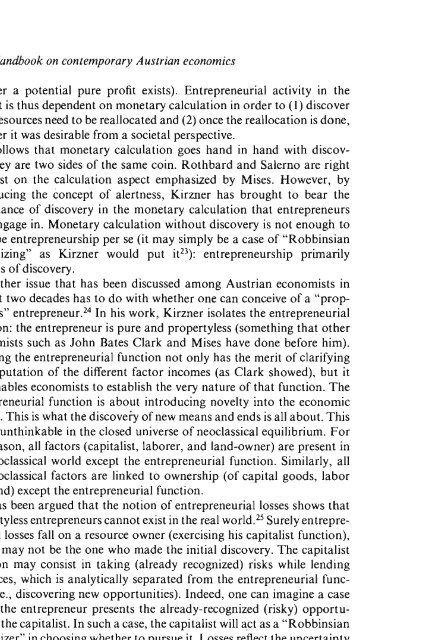Handbook on Contemporary Austrian Economics
Handbook on Contemporary Austrian Economics
Handbook on Contemporary Austrian Economics
You also want an ePaper? Increase the reach of your titles
YUMPU automatically turns print PDFs into web optimized ePapers that Google loves.
98 <str<strong>on</strong>g>Handbook</str<strong>on</strong>g> <strong>on</strong> c<strong>on</strong>temporary <strong>Austrian</strong> ec<strong>on</strong>omics<br />
whether a potential pure profit exists). Entrepreneurial activity in the<br />
market is thus dependent <strong>on</strong> m<strong>on</strong>etary calculati<strong>on</strong> in order to (1) discover<br />
what resources need to be reallocated and (2) <strong>on</strong>ce the reallocati<strong>on</strong> is d<strong>on</strong>e,<br />
whether it was desirable from a societal perspective.<br />
It follows that m<strong>on</strong>etary calculati<strong>on</strong> goes hand in hand with discovery:<br />
they are two sides of the same coin. Rothbard and Salerno are right<br />
to insist <strong>on</strong> the calculati<strong>on</strong> aspect emphasized by Mises. However, by<br />
introducing the c<strong>on</strong>cept of alertness, Kirzner has brought to bear the<br />
importance of discovery in the m<strong>on</strong>etary calculati<strong>on</strong> that entrepreneurs<br />
may engage in. M<strong>on</strong>etary calculati<strong>on</strong> without discovery is not enough to<br />
describe entrepreneurship per se (it may simply be a case of "Robbins ian<br />
maximizing" as Kirzner would put it 23 ): entrepreneurship primarily<br />
c<strong>on</strong>sists of discovery.<br />
Another issue that has been discussed am<strong>on</strong>g <strong>Austrian</strong> ec<strong>on</strong>omists in<br />
the last two decades has to do with whether <strong>on</strong>e can c<strong>on</strong>ceive of a "propertyless"<br />
entrepreneur. 24 In his work, Kirzner isolates the entrepreneurial<br />
functi<strong>on</strong>: the entrepreneur is pure and propertyless (something that other<br />
ec<strong>on</strong>omists such as John Bates Clark and Mises have d<strong>on</strong>e before him).<br />
Isolating the entrepreneurial functi<strong>on</strong> not <strong>on</strong>ly has the merit of clarifying<br />
the imputati<strong>on</strong> of the different factor incomes (as Clark showed), but it<br />
also enables ec<strong>on</strong>omists to establish the very nature of that functi<strong>on</strong>. The<br />
entrepreneurial functi<strong>on</strong> is about introducing novelty into the ec<strong>on</strong>omic<br />
system. This is what the discovery of new means and ends is all about. This<br />
role is unthinkable in the closed universe of neoclassical equilibrium. For<br />
this reas<strong>on</strong>, all factors (capitalist, laborer, and land-owner) are present in<br />
the neoclassical world except the entrepreneurial functi<strong>on</strong>. Similarly, all<br />
the neoclassical factors are linked to ownership (of capital goods, labor<br />
and land) except the entrepreneurial functi<strong>on</strong>.<br />
It has been argued that the noti<strong>on</strong> of entrepreneurial losses shows that<br />
propertyless entrepreneurs cannot exist in the real world. 25 Surely entrepreneuriallosses<br />
fall <strong>on</strong> a resource owner (exercising his capitalist functi<strong>on</strong>),<br />
but he may not be the <strong>on</strong>e who made the initial discovery. The capitalist<br />
functi<strong>on</strong> may c<strong>on</strong>sist in taking (already recognized) risks while lending<br />
resources, which is analytically separated from the entrepreneurial functi<strong>on</strong><br />
(i.e., discovering new opportunities). Indeed, <strong>on</strong>e can imagine a case<br />
where the entrepreneur presents the already-recognized (risky) opportunity<br />
to the capitalist. In such a case, the capitalist will Cl:ct as a "Robbinsian<br />
maximizer" in choosing whether to pursue it. Losses reflect the uncertainty<br />
of the future, not the impossibility of isolating the entrepreneurial functi<strong>on</strong>.<br />
It is true that in reality the individual exercising his entrepreneurial<br />
functi<strong>on</strong> always possesses at least <strong>on</strong>e factor: his own labor. But the fact<br />
that the entrepreneurial and capitalist functi<strong>on</strong>s are, in reality, often found

















